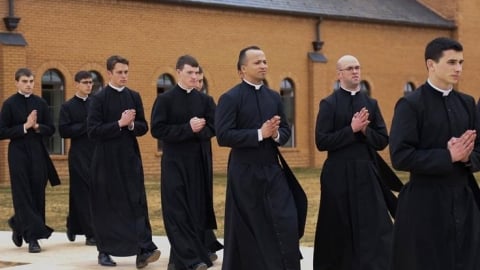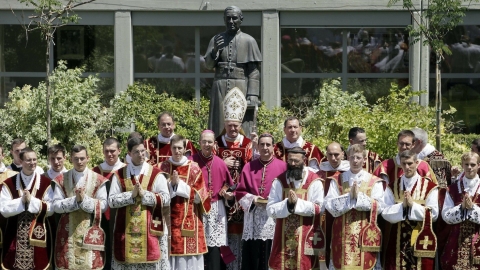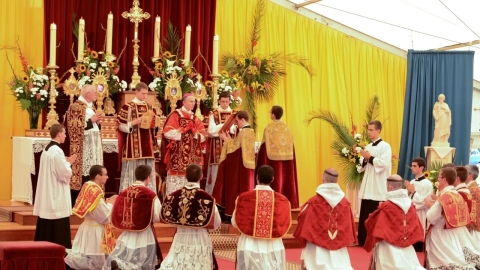Heavenly Knowledge

That burning thirst for knowledge which God places in the soul of every mortal being, which experience has taught us cannot be satisfied during the years of our exile, shall it not be quenched or shall we thirst thus forever? Has God planted a desire for knowledge that shall not be satisfied, commenced a work that He shall not bring to a successful issue? For those who desire "to know", and where are the persons who do not wish to advance, who are satisfied with their present imperfect, limited knowledge, these are interesting questions.
If this craving for knowledge were by its nature finite, surely the things of this world would satiate it, but, as everyday experiences teach, they do not. It is more than finite. It is infinite, and a thing of infinite capacity cannot be filled but by an Infinite Being, for "abyss calleth unto abyss," hence we must turn to God to satisfy this infinite craving.
Like a spark of fire which by continual fanning grows and spreads until it bursts forth into a mighty flame engulfing all, so this burning thirst for knowledge fanned day by day and year by year shall grow and expand until, shaking the dust from its earthly feet, it shall burst forth in the possession of All, for God is All. And with this possession of God the soul comes to the realization of that perfect knowledge for which it has been yearning. The light by which knowledge was acquired during a former existence becomes for the soul darkness as compared with the present Light, God, by which it now knows all things. "I shall then know, even as I am known," says Saint Paul.
Our knowledge of God and through Him all things else shall not be unlike His knowledge of us, penetrating and searching, though not exhausting. It is impossible for us to imagine the depth and all but comprehensiveness of this knowledge. Truly does Saint Paul tell us, "Eye hath not seen, nor ear heard, neither hath it entered into the heart of man, what things God hath prepared for them that love Him." (I Cor. II).
From the heights of this sublime state with the veil of uncertainty pushed aside, all doubts and questions set at rest, and in the presence of that eternal facial vision of God, all sufficient of itself to satisfy the unfathomable depths of our desires, we shall see clearly the multifarious mysteries of grace and of nature. All will be made clear: His essence; His attributes of justice, mercy, wisdom, goodness and omnipotence; the Triunity of Persons. But besides this essential knowledge of the blessed in heaven there is another knowledge called accidental which flows from the first. By it, theologians tell us, we shall see many other things, especially those which pertain to those periods of our lives classed as past, present and future.
For since celestial beatitude is a state perfected by the acquisition of all good, and there is in the blessed a legitimate desire of knowing whatever of interest is to them, they shall not be perfectly happy until they shall be in possession of this knowledge. The Triunity of Persons in God, the mysterious union of the divine and human nature in Christ, in a word all the truths of faith which we believe and to which we cling tenaciously while on earth shall be more clearly manifested to us hereafter. Then too, that doctrine which affords so much consolation even in this life, the Communion of Saints.
Into what transports of joy shall we be thrown in beholding ourselves in the company of those thousands upon thousands of victorious confessors, martyrs and virgins! There we shall see the white robed Dominicans enshrouded by the mantle of our Blessed Mother; the brown clad Franciscans and the members of the other religious Orders of men and women. There we shall engage in loving companionship with those saints for whom we had a special devotion during our struggles here below. Or again what feelings of joy shall we experience upon meeting those loved ones who have gone before us. Can anyone even faintly imagine the rapturous nature of the reunion of husband and wife, of parents and children, of loving relatives and friends who have so many times extended to us a helping hand to attain this coveted goal.
Then also shall we understand the mysterious workings of divine Providence; why our persistent prayers remained unanswered; why this or that special favor was denied or delayed: why grace was seemingly withheld; why evil-doers prospered and the virtuous were scorned. The mysterious workings of nature, too, according to theologians, shall give up her secrets. What is electricity? Are the planets inhabited? Questions and problems that baffle and rack the minds of men of all ages shall be answered. Have we been drawn to the study of any particular science? A complete knowledge of it awaits us above. What position do we hold in this strange land, for indeed it is a strange land as our true home is in heaven. Is it a public or a private position? If a public one and we are placed in charge of others then the actions of our former subjects will be made manifest to us. If we live a life devoid of the cares of a public office, then we shall see all those things that pertained to our former state in life.
Thus the Roman Pontiffs in heaven shall see, in particular, all that pertains to the government of the militant Church: heads of families shall watch over the actions of their children: children too shall be gifted with that heavenly vision of seeing parents and loved ones still on earth. And all shall hear the prayers and supplications addressed to them. This edge awaits perfect heavenly knowledge but one of the joys that those who have joined themselves to Him and endured. Yet is it not worth the struggle to "so pass through the things of time as not to forfeit those of eternity?" (Collect for 3rd Sunday after Pentecost).





